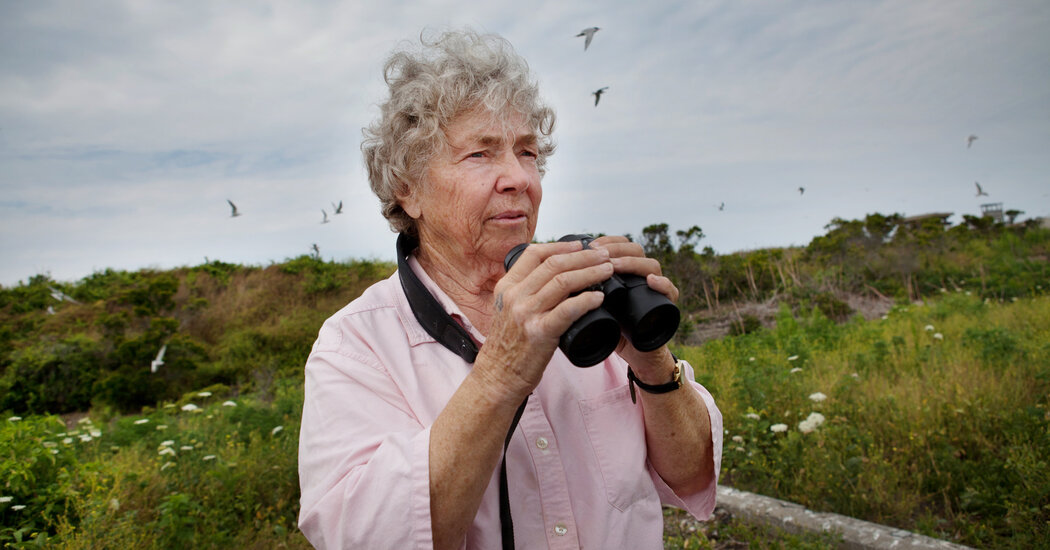Helen Hays, an intrepid ornithologist who for nearly 50 years led scores of volunteers to Great Gull Island, a postage-stamp islet in Long Island Sound, where they endured dive-bombing birds and fierce ocean storms to help revitalize it as one of the world’s largest nesting sites for common and roseate terns, died on Feb. 5 in Scarsdale, N.Y. She was 94.
Her brother, James Hays, said the death, at a care facility, was from dementia.
Terns, both the common and roseate variety, are compact seabirds sometimes confused with gulls. They are also Olympic-level migrators: After nesting in secluded places like Great Gull Island, they travel as far as Argentina for the winter.
Ms. Hays was quite the migrator herself. Every spring she would leave her Manhattan apartment for Great Gull, a narrow, 17-acre slip of land that had been a U.S. Army fort until the end of World War II, when the military gave it to the American Museum of Natural History for $1. It lies just east of the tip of Long Island’s North Fork.
As chairwoman of the museum’s Great Gull Island Project, she would set up camp among the concrete bunkers left over from the fort, welcoming the first of several dozen volunteers, mostly high school and college students, who would arrive for stints on the island over the coming months.
There is no running water or reliable electricity on Great Gull Island; supplies arrive on a weekly mail boat. Should storms hit — and they often do — the researchers simply rode out the weather.
The birds themselves could be a hazard. Aside from their ubiquitous droppings — on the ground, on handrails, falling like rain from overhead — terns are terribly territorial, constantly pecking at the human interlopers. Ms. Hays took the occasional nip in stride; others wore straw hats with fake flowers stuck in the brims, to give the terns something other than a head to attack.
Ms. Hays ran the Great Gull Island Project with precision. Every morning at 6, she would rouse her volunteers over a loudspeaker, shouting things like: “No more napping. Time for trapping!”
They would work sunup to sundown, every day, sometimes braving the birds to collect samples or tag newborns, other times crouching for hours in one of the island’s 31 blinds, wooden structures designed to let them observe the birds up close.
Not surprisingly, most volunteers lasted just a few weeks. Ms. Hays, who began her annual trips in 1969, spent a full five months there, every single year, only stopping when Covid stopped everything in 2020.
Terns had long made Great Gull Island a temporary home. But after hatmakers and fashion mavens of the early 20th century killed them by the millions for their feathers nationwide, the common tern was considered a threatened species and the roseate tern endangered by the time Ms. Hays first began her work.
Thanks in large part to her diligence in making the island once again a welcome site for nesting, the number of mating pairs rebounded, going from about 3,000 in 1969 to more than 11,000 in the 2010s.
Ms. Hays’s work was not just for the good of the birds. Early on, her constant, close observation allowed her to track birth defects in tern chicks; further research led her to conclude that PCBs, a then-unsuspected class of chemicals, was the cause — making her among the first scientists to warn of their danger to animals and humans.
“She was tireless,” Joseph DiCostanzo, an ornithologist at the Museum of Natural History and a frequent volunteer on Great Gull, said in a phone interview. “I can remember being on the island and watching her run circles around students who were a third her age.”
Helen Hays was born on Jan. 22, 1931, in Johnstown, N.Y., an industrial town northwest of Albany. Johnstown specialized in leather goods, and her father, David, ran a glove factory; her mother, Helen (Stewart) Hays, wrote books about the region’s culture and history.
Helen found herself drawn to the idea of biological field work from an early age, and built her academic career around it. She studied biology at Wellesley College, and after graduating in 1953, she cast about for graduate programs that would get her directly into field work.
Soon she was in Manitoba, studying the ruddy duck at a field station run by Cornell University. She was working toward a master’s degree, but left before graduating.
Ms. Hays had been working in an office at the Museum of Natural History for a few years when she learned of discussions about what to do with Great Gull Island. When she heard that at least one museum donor was interested in supporting field research on terns, she jumped at the chance.
Ms. Hays never married and had no children. Her brother is her only immediate survivor.
Ms. Hays was herself a volunteer at the museum; though it gave her office space, she raised all her funding herself. Perhaps her greatest skill was persuading so many people to work for her without pay on a near-barren island in the middle of the summer.
Under her command, the Great Gull Island Project became a tight-knit community; marriages came out of relationships born among the terns, and at least one parent who volunteered as a student later sent her own son to volunteer with Ms. Hays decades later.
“She inspired people,” said Joel L. Cracraft, an ornithologist at the museum. “Helen did it all.”


